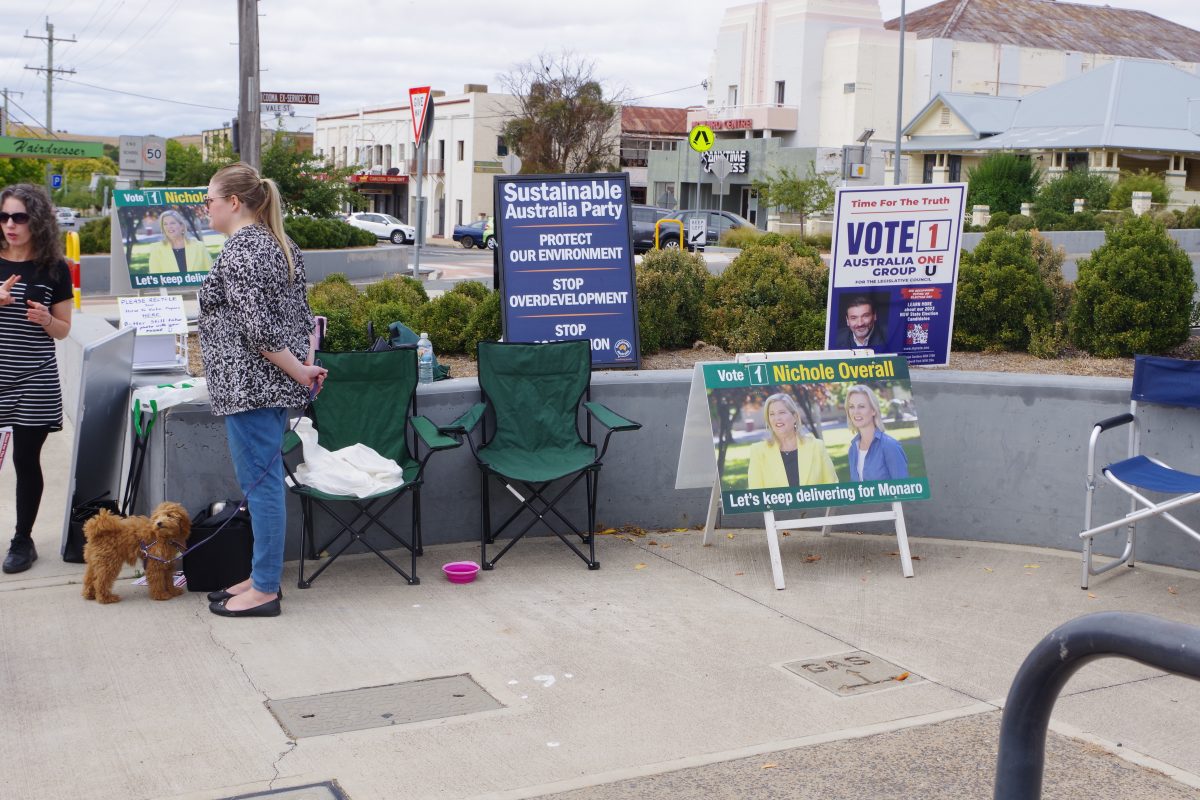
Pre-polling centres across Monaro are seeing steady traffic this week. Photo: Gail Eastaway.
With only days to go until the NSW state election on Saturday, issues that voters are considering in the Monaro electorate seem to focus on grassroots matters.
Across all sectors of the community, the cost of living is a major issue with recent power price increases predicted to continue up to 25 per cent or more in the next 12 months.
For those on a fixed income, that’s an unsettling prospect, especially as, in the Snowy Monaro Regional Council (SMRC) area, a rate increase is expected to kick in about the same time.
For SMRC ratepayers, there are now increasing calls for a demerger of the council and the restoration of the three previous local government areas covering Cooma, Bombala and Jindabyne.
Also for this end of the electorate, the call is for improved aged-care services.
Recently, Cooma’s primary aged-care facility, the Sir William Hudson Memorial Centre, announced a merger with Respect Group Limited to ensure the facility’s future.
The former board was hopeful the merger will make the home sustainable and allow necessary upgrades to be carried out.
About the same time, the focus switched to aged-care facilities further south, with the State Government committing to spending $15 million on a major expansion of the Bombala Multi-Purpose Service to future-proof aged-care services in the town and surrounds.
This was supported by the Currawarna Assisted Living Limited (CALL) declaration that Currawarna would reopen as an assisted-living service with or without government funding.
(Currawarna closed in April 2022, citing staffing issues as the main reason. All 20 residents at the time were forced to relocate.)
This week, Labor’s candidate Steve Whan announced a tit-for-tat commitment of $15m for the same purpose.
In Jindabyne, the issues relate to roads, a universal topic across Monaro, as well as some specifics relating to the Special Activation Precinct (SAP).
The SAP is projected to turn Jindabyne and the nearby ski resorts into a 365-days-a-year destination, most likely changing a town of 2500 residents into one of 10,000 or more.
Already the town has seen a new public library constructed, with work now underway on a site for a new Jindabyne Central School, a new police station and plans for a new ambulance station.
An offshoot of all this activity is an increase in real estate prices and rents.
Buying property in and around Jindabyne now is not for the faint-hearted. The rent increases have further impacted accommodation opportunities for the region’s seasonal workers, who can struggle to find accommodation if it is not provided by their employer.
Roads – from Goulburn to Delegate – are an issue across Monaro.
Three wet years, which were also impacted by COVID restrictions, have left highways and local roads in a state of disrepair.
Local roads, the responsibility of local councils, have been particularly hard hit.
State Government funding has been easing the situation, but more needs to be done.
Given the amount of traffic on the Monaro and Snowy Mountains highways, particularly in winter as the ski resorts return to full capacity, there are again calls for improvements to those roads.
More overtaking lanes between Cooma and Canberra are a frequent call on the State Government.
Attracting more doctors to the region is also an issue for Monaro.
Snowy Monaro is fortunate to be part of the Rural Doctors Training project, in which final-year medical students live and work in Cooma, using local surgeries and the hospital for training.
But local surgeries still need to attract and keep GPs as the existing doctors look to cutting back or retiring.
Attracting GPs to the bush is an ongoing problem local practices struggle to solve.
Also health-related is the pressure to attract and keep other medical staff such as nurses and allied health workers.
The pandemic highlighted the value of nurses to our community, but unfortunately, the pandemic took its toll, with overwork and burnout still having an effect.
According to some sectors of the community, appropriate and affordable housing is a major issue locally.
In Cooma, older community members being asked to vacate rental properties in the recent nationwide post-COVID rural housing price boom has been real to us over the past six to 12 months.
The local Salvation Army believes this is a result of decades of inadequate community housing being built,
The rising cost of living is now the leading reason people present to The Salvation Army’s emergency relief services, with the number of clients seeking help increasing at alarming rates.
To help address the issue, the Salvos have lodged a submission to the Senate Select Committee on the Cost of Living to highlight the devastating impact on the people it works with and to suggest solutions.
The Salvation Army’s general manager of policy and advocacy, Jennifer Kirkaldy, who researched and wrote the submission, said: “What we have found is that the people who were already doing it tough are now experiencing extreme hardship.”







